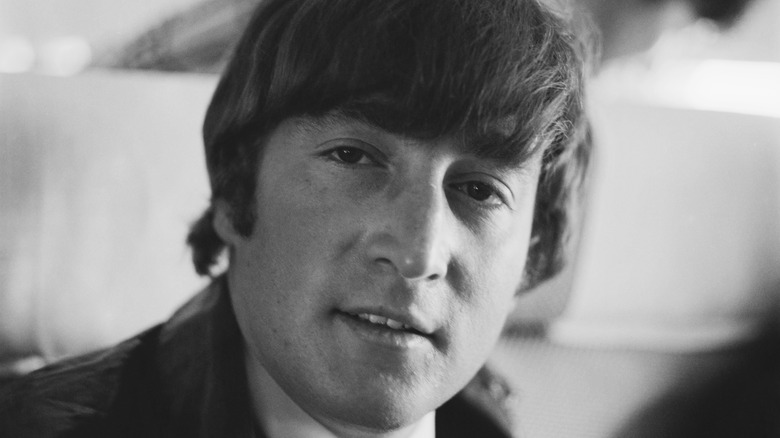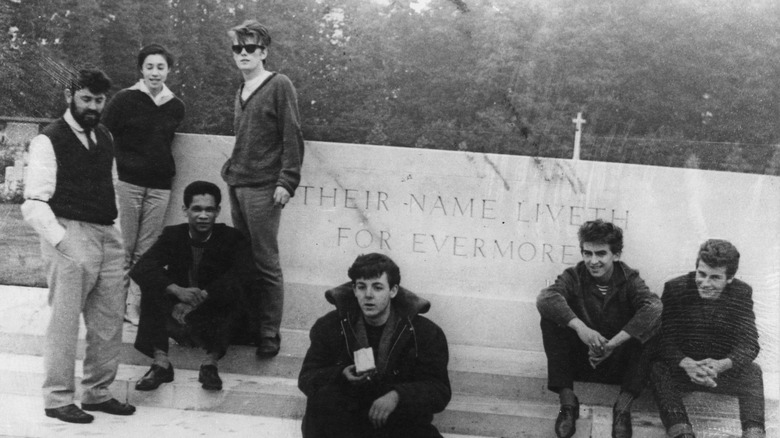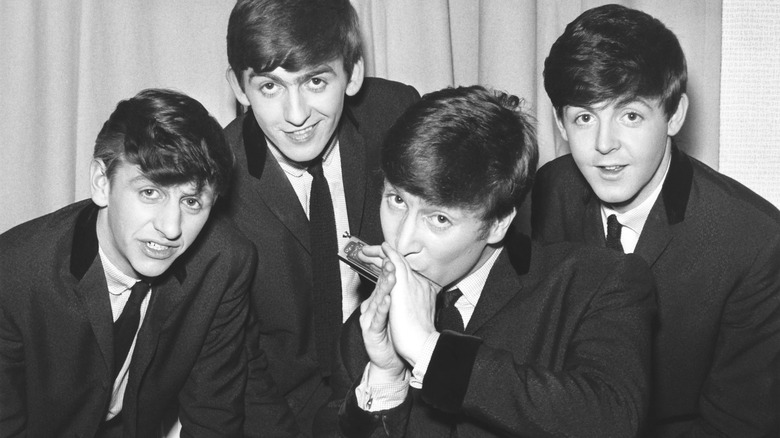What John Lennon Stole From A Music Shop On The Beatles' First Trip Abroad
"I grew up in Hamburg, not Liverpool," John Lennon once declared, which may come as news to many millions of Beatles fans for whom the Fab Four are synonymous with the northern English port city. But in many ways Lennon was right, and he also spoke for the other members of the Beatles in that regard. Because without Hamburg, the Beatles would never have become the legendary band that they grew to be.
Per The Beatles Anthology, the band became aware of gigging opportunities in Germany after a rival band, Derry and the Seniors, were hired by the German concert promoter Bruno Koschmider, to perform at his Kaiserkeller club in Hamburg, and based on their success approached the Beatles' first manager, Allan Williams, to secure another Liverpool band for another club, the Indra.
The Beatles' experiences in Hamburg have been well-documented, with the teenage band — which also included original bassist Stuart Sutcliffe, as well as drummer Pete Best — reportedly relishing the city's nightlife and hedonistic decadence. However, it wasn't just in Hamburg that the Beatles were pushing boundaries. As Lennon himself recalled via the same source, the band's first trip to Europe in 1960 was taken by car, on a ferry crossing from Harwich. "Allan Williams took us over in a van," said Lennon, "We went through Holland, and did a bit of shoplifting there."
The incident in Arnhem
The Beatles Anthology doesn't delve into exactly how much shoplifting John Lennon and the rest of the Beatles got up to in Holland, and Lennon's recollection seems intentionally vague. But one incident has been recorded for posterity, one which occurred in the Dutch town of Arnhem, known for its Arnhem Oosterbeek War Cemetery which holds the remains of hundreds of British World War II servicemen — when the band and their cohort were headed to Hamburg for the first time.
Lewisohn notes that manager Allan Williams has claimed that the visit to Arnhem was an emotional one for the young band, and especially for Lennon, who was both sensitive and impulsive. As the historian notes, a photograph of the group taken at an Arnhem war memorial is notable for John Lennon's conspicuous absence, with Williams recollecting that the young musician was so troubled by the sight of so many graves — one of which, by coincidence, bore the name of the band's then-drummer, Peter Best — holding the remains of men of their own age that he decided to stay in the bus to keep his composure.
However, Lennon, who was also something of a show-off, found a way of restoring his street cred among the group. Williams and the band looked around a music shop, and then, out on the street, Lennon revealed a harmonica he had stolen, mortifying Williams who worried whether the band would be arrested before they made it to Hamburg.
Love Me Do
John Lennon had learned to play the mouth organ — or harmonica — as a small child when he was gifted one by a houseguest, Harold Phillips, who had bet the boy that he couldn't learn a song on Phillips' own harmonica in one day (Lennon learned two, and won the harmonica, according to Mark Lewisohn). So it was perhaps no surprise that the object he decided to steal in that Arnhem music shop should be his favorite childhood instrument, and that Lennon played his new stolen mouth organ for the rest of the journey.
Though the Beatles are remembered as a guitar band, their recording careers were heralded first and foremost by the sound of the mouth organ, a melody from which makes up the unmistakable opening bars of the Fab Four's debut single, "Love Me Do." But if it weren't for Lennon's foray into petty crime on that first journey to Hamburg, the record may have sounded quite different, as, according to Song Facts, the mouth organ on that recording is the very same one that Lennon shoplifted on his first trip to Europe.


